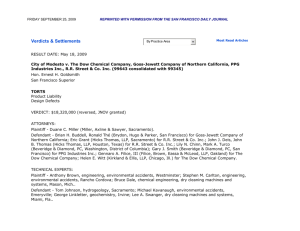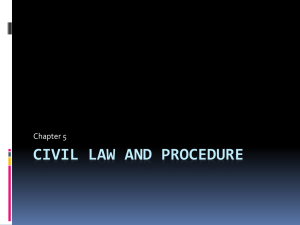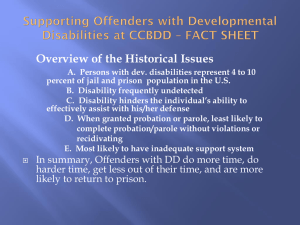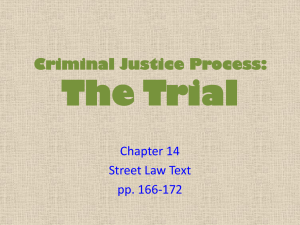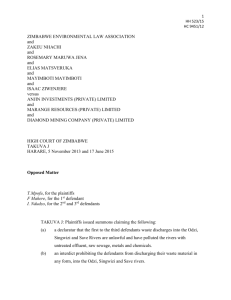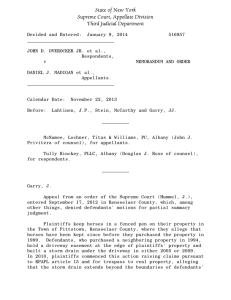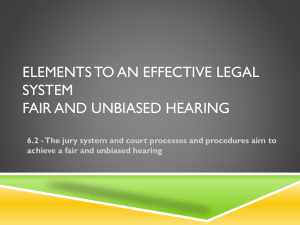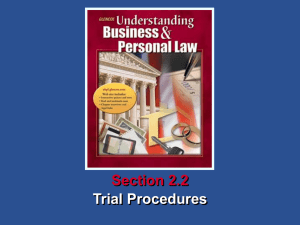PALS - 2013 - American Bar Association
advertisement
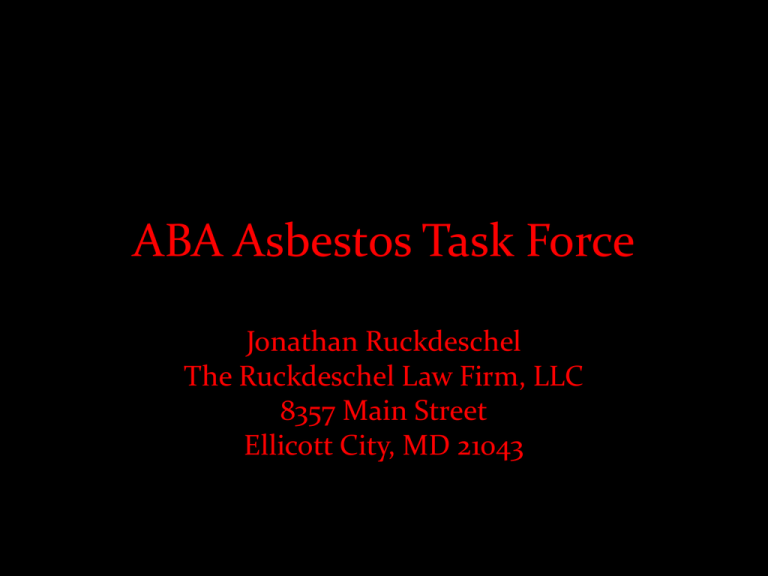
ABA Asbestos Task Force Jonathan Ruckdeschel The Ruckdeschel Law Firm, LLC 8357 Main Street Ellicott City, MD 21043 National Crisis? • Bankrupt companies proclaim Chapter 11 has been boon for them. • Fewer and fewer asbestos cases being brought. • MDL-875 disbanded due to lack of interest. • One retired judge manages entire Baltimore docket of asbestos cases. • Even defense counsel testifying today agree that the cases in the tort system today involve terminally ill individuals. Only a jury can quantify what constitutes “full value” for these cases. Defendants Are Not The Victims Here Who Will Be The Whipping Boy? June 1970 We realize that someone will be the whipping boy, also product liability will be stressed. It is our opinion that the entire blame can be placed on the contractor, for not insisting on respirators and dust masks when sanding. What’s the right policy? • When an innocent party is harmed by multiple wrongdoers, the burden of insolvency of one of the multiple wrongdoers should be borne by the other tortfeasors not the injured party. What’s the right policy? • Behrens – if we knew total setoff from settlements in Illinois defendants would be more willing to go to trial and roll the dice. • Problem of being lobbyist rather than trial lawyer. • That’s precisely why the law is what it is. – Plaintiffs sitting on large settlement pot know they have hard hurdle – mitigates reasonableness – Defendants not knowing how big setoff will be cannot bank on having large cushion. Trust Claim On Site ID Is Not Proof Of Exposure Or Admission Of Exposure • Suggestion that mandatory claim filing is necessary to identify jobsites on approved site lists is absurd. • Premise that filing a claim based on site-id is an “admission” of anything other than that plaintiff was at the site has no basis in fact or law. • The trust determines what quantum of evidence is sufficient. Trusts accept fiber drift, courts do not. No Different Than Workman’s Comp. • Filing of a workman’s compensation claim against an employer is not an “admission” that the employer is at fault. • In subsequent tort case against third party that harmed worker on the job, the prior comp claim is not an admission of fault of the employer that relieves the defendant from its burden of proof. Stengel – Our Handful of Examples Is Different Than Your Handful Of Examples. • Nonsense. • BASF, Sherwin Williams, OI, John Crane – hid existence of documents, products, testing results. • Georgia Pacific, Big Three Car Companies, Gasket Companies – all hiring tobacco scientists to seed the medical literature with doubt science • Michaels “Doubt Is Their Product” Stengel Comment Re: Plaintiff Knowledge • Comment is plaintiffs don’t know who caused their disease until lawyers get involved. • Union Carbide supplied asbestos fiber that companies put into their products. • No way a sick person would ever know that UCC fiber in GP joint compound, floor tile or anything else. Stengel Comment Re: Depositions • 7 hour limits? • Not in my jurisdictions. • Depositions of bed-bound plaintiffs in hospice care last days. • No defendant gives more than lip service to trying to discovery identification of bankrupt companies in deposition. • OCF? Stengel Comments Regarding Motivation of Plaintiffs Regarding Timing • Assertion that Plaintiffs delay filing to prevent disclosure. – Speculation. • All sorts of reasons to delay filing. – Most significant reason to delay is to avoid disproportionate setoff. – Lack of information – Concern defendants will misrepresent what “approved site” claim means to Court. Stengel Comments Regarding Last Minute Disclosures • The handful of examples defendants constantly cite involve pre-trial disclosure – albeit belatedly. • These examples have resulted in appropriate sanctions by the trial courts. Stengel Comments Regarding Fundamental Changes To Existing Trusts • Stengel’s comments regarding changing trusts to require exposure information equivalent to that in courts. – At least Lohrman • That is not the policy decision that has been made. • Moreover, the trusts were formed and payments structured to reflect tort system liabilities • Bondex bankruptcy rejected this Alice in Wonderland “we shouldn’t have had the tort liabilities we had approach. • My clients would prefer different payment structure, but it does not reflect reality. Behrens Comments Re Silica • Judge Jack’s ruling regarding silica cases has nothing to do with the asbestos litigation. • Behrens says change in claimant mix partly results from Judge Jack. – Nonsense. – Entire theory of the defense in silica was that asbestos cases were being re-filed as silica cases Behrens Comments Re Fraud • We don’t have evidence of “the fraud” • I don’t believe the trustees that they don’t have evidence of fraud. • I don’t know of any court now that would say that filed claim forms are not discoverable. • A lot of Case Management Orders mandate disclosure. • Entire premise is that there must be fraud. Behrens – Unfair To Not Require Filing Of Claims Pre-Trial • State law controls. • Maryland court rejected requests of defendants to mandate filing of claims. – Contrary to 100 years of joint tortfeasor law. – Plaintiff chooses who to sue. – Defendants are free to join third parties plaintiffs chose not to sue. • Mandatory filing creates inequitable results and will be abused for purposes of delay by defendants. Evidentiary Issues • Tort System Discovery Obligations Of All Parties – Exposure information – Settlement information Bankruptcy Claims/Mandatory Filing • Baltimore scheduling orders mandate disclosure of claim forms and exposure information. • Maryland law provides that the fact of settlement and type of release are discoverable but amounts are not before a verdict. • Baltimore Court has rejected mandatory filing based upon over 100 years of Maryland tort law. Exposure Information • Exposure information – Plaintiffs are disclosing and are deposed extensively. – Defendants uniformly refuse to produce exposure information regarding these cases. – Case management order in Baltimore requires Defendants identify witnesses who have testified about the job sites in question. – Defendants uniformly refuse to produce this information. Settlement Information • Confidential settlements are critical to litigation policy. – Defendants insist upon it. – Defendants don’t want to give up this information. – Case law and rules protect this information. – This promotes negotiated resolutions. Compensation Issues • Compensating Meritorious Claims • Tort System Payments and trust system payments – “Double Dipping” – Recovery of more than jury verdict Compensating Meritorious Claims? • • • • Nearly all claims are cancer claims. Mesothelioma is uniformly fatal. Nearly all lung cancer victims die from cancer. The JURY decides what is “meritorious”. Tort & Trust Payments – “Double Dipping” • Defense propaganda • The jury determines the plaintiff ’s damages. • Until a jury quantifies the damages, there can NEVER be a “double recovery”. • How each state deals with apportionment, joint and several liability and setoffs for settlements are matters of state law. Tort & Trust Payments – Recovery of more than jury verdict • State laws recognize and accept that in multitortfeasor cases, a plaintiff can recover through settlement more (or less) than the jury’s verdict. • This policy promotes settlement. • Once jury quantifies damages, plaintiff cannot recover by judgment more than their quantified damages. Restatement (Second) Judgments § 49 • Restatement (Second) of Judgments § 49 (1982) • A judgment against one person liable for a loss does not terminate a claim that the injured party may have against another person who may be liable therefor. Settlements Of Disputed Claims Can Never Constitute “Double Recovery” • 9 defendants settle for $4.5 million • Defendant 10 goes to verdict. • Verdict of $3,500,000. • What judgment, if any, will be entered against Defendant 10 is a matter of state law and is not a “double recovery.” Joint and Several Liability State • Defendant 10 proves cross-claims against all 9 settled defendants – judgment of $0.00. • Defendant 10 proves cross-claims against 4 of 9 settled defendants – verdict reduced by $2,000,000, judgment of $1,500,000. Total recovery $6,000,000. • Defendant 10 fails to prove cross-claims against any settled defendants – judgment of $3,500,000. Total Recovery $8,000,000. Joint and Several Liability # Defendants Settlements Verdict # Cross Claims Proven Judgment Total Recovery 10 $4,500,000 $10,000,000 9 $1,000,000 $5,500,000 10 $4,500,000 $10,000,000 1 $5,000,000 $9,500,000 10 $4,500,000 $10,000,000 0 $10,000,000 $14,500,000 4 <$4,000,000 $22,000,000 3 $5,500,000 <$10,000,000 I Not A Double Recovery When Verdict Defendant Fails To Prove Cross-Claim • Joan Dixon settles case with GP, Honeywell and Union Carbide. • Ford goes to verdict and fails to prove cross-claim against any of them. • It is not a double recovery that Plaintiff received settlements. Apportionment State • Defendant has burden of proving apportionment of fault to other entities. • Can include settled defendants, non-parties and, depending on jurisdiction, even immune parties. • Defendant pays only portion of verdict attributed to it by the jury. • Each State decides what the rules are. • There is simply nothing improper or inherently wrong with a Plaintiff recovering more than the total jury verdict through settlements of disputed claims. • State laws determine how these matters affect the judgment entered against the verdict defendant. Ethical Issues In Adversarial System – Disclosure duties of plaintiff and defense counsel. – Far more examples of defendants manipulating discovery than defendants. – Sanctions against defendants are consistently required to get basic information.

